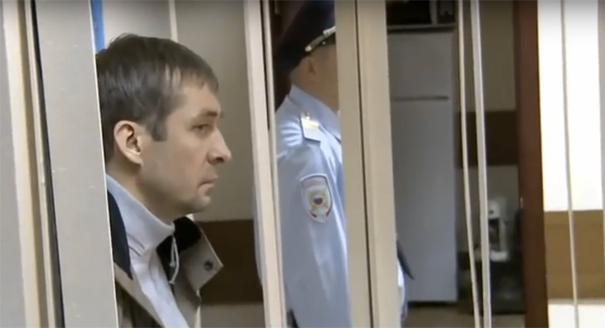Economists correctly describe Russia’s sociopolitical order as “market feudalism.” The market is at the core of its economy, and feudalism is at the core of its management and political systems. Knowing this, we shouldn’t be surprised when Russia’s feudal lords engage in their favorite activity: raiding each other’s fiefdoms.
In the Russian feudal state, lords like to flex their muscles and show off how much support they have “from above.” Those with greater strength and more powerful patrons are able to expand their fiefdoms and attack others; their adversaries return the favor as soon as the balance of power shifts.
There have been plenty of these oligarchic wars in Russia over the last two and a half decades. A new kind of war has emerged recently, however: the siloviki, the country’s omnipotent security establishment (and the Russian equivalent of a chivalric-religious order), have started attacking old lords and fighting among themselves.
The September 10 arrest of Dmitry Zakharchenko, the acting head of one of Russia’s anti-corruption agencies who was caught hiding $120 million in cash in his sister’s home and over $300 million in foreign bank accounts registered in his father’s name, is a perfect example of such an attack.
In this feudal war, it’s likely that Zakharchenko’s attackers didn’t care about the money, which will now end up in the state’s coffers. Rather, they were interested in the kind of business that is able to generate all that cash.
So, the question is: what kind of business were they feuding over?
It stands to reason that $120 million in cash and $300 million in foreign accounts is too large a sum to be controlled by the head of an anti-graft unit—an important and well-armed but controllable justiciar. Besides, no one keeps that kind of money in stacks in one’s apartment; it is usually channeled overseas as soon as possible, and Zakharchenko clearly had ample opportunity to do so.
The suggestion that the money belongs to someone else doesn’t hold water either; very few rich people keep their money in cash, and even if they have to, they find a better caretaker than the person responsible for sensitive operations inside a law enforcement unit. In all likelihood, the money was liquid capital making a brief stop at Zakharchenko’s residence; other means of hiding the money had probably failed and he didn’t think he was in danger of being caught.
There are only two businesses in Russia that involve moving such large amounts of hard cash: contraband importation and money laundering schemes designed to shelter profits (often as a means of tax evasion).
It is theoretically possible that Zakharchenko was part of a money-laundering scheme, which usually involves not only fake contracts signed by companies registered for a single day, but also a chain of commercial banks ready to deliver piles of cash in exchange for piles of fictitious contracts. But in this case, most of the cash would have been in rubles—this money usually remains inside the country as a way of paying “black” salaries and supporting informal markets.
In all likelihood, Federal Security Service (FSB) operatives caught Zakharchenko while he was moving money for the importation of contraband. The contraband market in Russia is enormous. For example, there is a $10 million gap between Russia’s calculations of Chinese imports and China’s numbers on exports to Russia, and such a gap exists for imports from many other countries.
Contraband goods are brought into Russia labeled as something less expensive or exempt from tariffs, or are undeclared altogether in order to avoid paying heavy customs duties. In Russia they’re sold to small shops and even official distributors, where retail prices top 250 percent of the cost of importation. Smuggled goods from China earn up to $25 billion a year for their importers.
Undeclared excess cash must be converted into dollars and sent back to the seller so that more of the product can be illegally imported. Those who convert the money take a cut of between 3 and 10 percent, meaning they earn as much as $1.25 billion per year.
Ordinary people can neither cross into Russia with contraband nor transfer large amounts of money abroad without legal grounds to do so; only those who are part of the system can. And who is more a part of the system than top law enforcement officials? In the Zakharchenko case, it seems as though the FSB, which has been trying to gain control over smuggling and capital exports, found out about the timing of a large transfer and attacked while the “caravan was in transit.”
The $300 million held in Swiss bank accounts, which may belong to those who are actually in charge of the smuggling business, raises a different set of questions, namely: how did Zakharchenko, someone with obvious political affiliations, manage to open accounts with banks that spend months investigating potential clients and refuse to work with those who have political ties?
We will probably never know who contacted the banks asking them to open the accounts, but we do know that it must have been an individual powerful enough to influence the banks’ economic interests and perhaps even the interests of the countries in which the accounts were opened. Though we won’t learn this person’s identity, the fact that his accounts were publicized limits the range of suspects to those high-ranking officials who have recently fallen out of favor.
As for Zakharchenko’s fiefdom? The state—the most powerful of all feudal lords—will take his cash as tribute. The takeover will thus be “legal” and the “business” will remain in operation.



